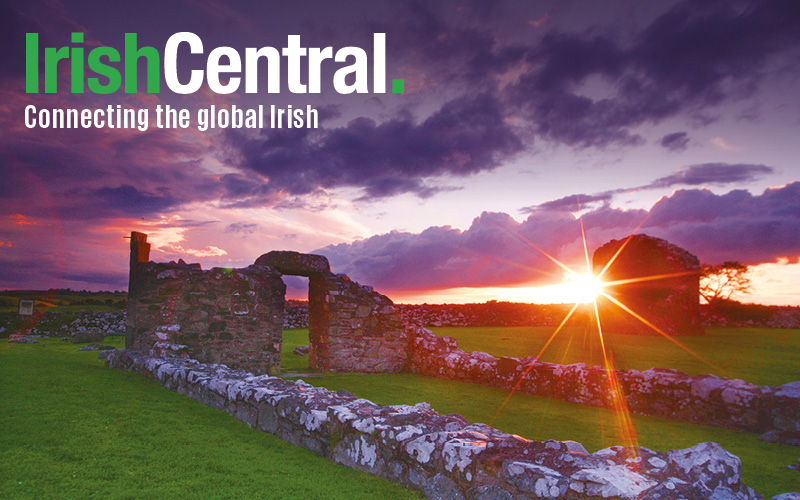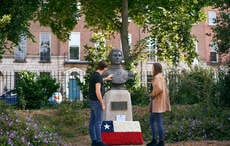Imam Muhammad Al-Hussaini’s beautiful singing voice was first noticed in Irish circles after he sang the ‘Boys of Barr Na Sráide’ one night during the first Gaelic Voices Celtic music festival two years ago.
“That was my first time singing in public; it was a very shy experience. I am not used to singing in a public context. People came up and said that I had got a good voice and needed to take it forward,” said Al-Hussaini, a second-generation British Muslim who grew up in London in the 1970s.
Al-Hussaini, currently a fellow in Islamic Studies at the Westminster Institute in London, told the Irish Times that before that experience, he had started going to the London-Irish Centre to learn the fiddle.
“I had always listened to and loved Irish music, but I didn’t feel that I could participate in it.”
He calls the Camden center his “safe space.”
“The welcome was extraordinary. The welcome that I have had from the diaspora community here has been unparalleled.”
He says he grew up with “the privilege of a plural environment” in London and had many English, Irish, Jewish, and other boyhood friends.
“I felt a sense of kinship. I always had a deep love of Irish culture and history, the sense of family.”
Al-Hussaini’s fiddle teacher, Karen Ryan, introduced him to her uncle, Pat Connolly, a Connemara sean-nós singer living in London.
“He runs singing sessions in this room. I sat at the feet of the master and picked up technique and style,” he says.
“I was completely captivated. Iarla Ó Lionáird’s magical voice caused me to reflect on how closely the Arabic-Islamic musical tradition and recitation of sacred scriptures, in which I have been trained as an imam, so remarkably resembles the heavily ornamented style of traditional Irish language song.”
Al-Hussaini began with a mixture of English and Irish and simple Irish songs and listened to “great singers like Joe Heaney”, and the late Waterford singer, Nioclás Tóibín.
He competed and won in Gaelic Voices last year.
“That was a huge boost to morale. So I started to take it more seriously, studying the Irish language.”
Another singing teacher, Kathleen O’Sullivan, helped him prepare for the early entry rounds for the Fleadh, winning the All-Britain before he headed to the main competition.
“I didn’t win it, but I did get placed,” he says.
Al-Hussaini says he is disliked by many Muslim conservatives.
“I have received a lot of criticism for doing music, not just for sean nós. There is a conservative reading of Islam that discourages music and in some cases explicitly bans it,” he says.
“Some say ‘Muhammad, this is wrong, this is wrong, theologically wrong – whatever the musical traditions’. I don’t think they make any distinctions. They don’t emphasize the Irish over anything else.”
Some believe songs that speak of unrequited, or lost, love demean the status of an imam: “I have had my ears tugged on a few occasions,” he says.
Some argue that if he has to sing, he should sing Arabic devotional songs, known as nasheeds, although many do not accept even that.
Conservative Muslim opinion is one thing, but extremists are another, and Al-Hussaini, who publicly condemned the Charlie Hebdo massacre in television and newspaper interviews, has received social media abuse and even feces-smeared letters from extremists.
“Extremism seeks to abolish the arts. Isis ban coloured pencils because it is a form of ideological mind-control which the arts frees one from. Arts promote a sense of humanity and expression that is not necessarily constrained by a literalist reading of scripture,” he says.
“So it is in the interests of those who have that particular agenda to sit upon expressions of art, even if they are traditionalist expressions of culture.” In any event, song and poetry is wedded into Arabic culture, “long epic poems, our equivalent of the Odyssey and the Aeneid, that were sung around the Bedouin camp fire.
“People still have the whole of these poems in their heads. There are poetry recitation competitions all over the Gulf. You can become a millionaire from winning one of these, they are so highly valued.”
But Al-Hussaini would rather talk about sean nós, not extremism: “The regional ways of singing are important to me, I am a real obsessive compulsive, I am really keen to ensure that the way that I sing honours the tradition.
“In the west of Ireland there is a strongly nasal way of singing. The voice is up there, high in the head. It is really important to me to learn that, I haven’t yet but I am still working on it.”
“When I sing sean nós I feel I am reciting sacred verses in Irish. It really feels like that. In our hearts, we are all Irish.”




Comments